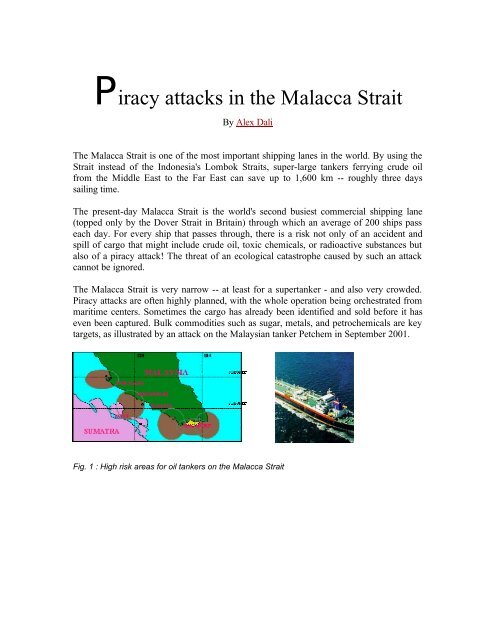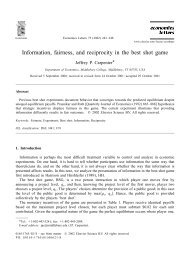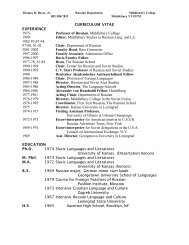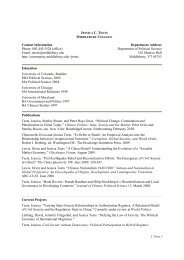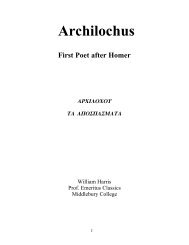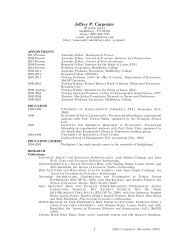Piracy in the Moluccan Strait - Community Home Page
Piracy in the Moluccan Strait - Community Home Page
Piracy in the Moluccan Strait - Community Home Page
Create successful ePaper yourself
Turn your PDF publications into a flip-book with our unique Google optimized e-Paper software.
<strong>Piracy</strong> attacks <strong>in</strong> <strong>the</strong> Malacca <strong>Strait</strong><br />
By Alex Dali<br />
The Malacca <strong>Strait</strong> is one of <strong>the</strong> most important shipp<strong>in</strong>g lanes <strong>in</strong> <strong>the</strong> world. By us<strong>in</strong>g <strong>the</strong><br />
<strong>Strait</strong> <strong>in</strong>stead of <strong>the</strong> Indonesia's Lombok <strong>Strait</strong>s, super-large tankers ferry<strong>in</strong>g crude oil<br />
from <strong>the</strong> Middle East to <strong>the</strong> Far East can save up to 1,600 km -- roughly three days<br />
sail<strong>in</strong>g time.<br />
The present-day Malacca <strong>Strait</strong> is <strong>the</strong> world's second busiest commercial shipp<strong>in</strong>g lane<br />
(topped only by <strong>the</strong> Dover <strong>Strait</strong> <strong>in</strong> Brita<strong>in</strong>) through which an average of 200 ships pass<br />
each day. For every ship that passes through, <strong>the</strong>re is a risk not only of an accident and<br />
spill of cargo that might <strong>in</strong>clude crude oil, toxic chemicals, or radioactive substances but<br />
also of a piracy attack! The threat of an ecological catastrophe caused by such an attack<br />
cannot be ignored.<br />
The Malacca <strong>Strait</strong> is very narrow -- at least for a supertanker - and also very crowded.<br />
<strong>Piracy</strong> attacks are often highly planned, with <strong>the</strong> whole operation be<strong>in</strong>g orchestrated from<br />
maritime centers. Sometimes <strong>the</strong> cargo has already been identified and sold before it has<br />
even been captured. Bulk commodities such as sugar, metals, and petrochemicals are key<br />
targets, as illustrated by an attack on <strong>the</strong> Malaysian tanker Petchem <strong>in</strong> September 2001.<br />
Fig. 1 : High risk areas for oil tankers on <strong>the</strong> Malacca <strong>Strait</strong>
300 cases<br />
Fig. 2 : Number of piracy attacks world-wide<br />
469 cases<br />
365 cases<br />
Year 1999 Year 2000 Year 2001<br />
Number of attacks 300 469 365<br />
Source : ICC <strong>Piracy</strong> Report, 2001<br />
<strong>Piracy</strong> has become so bad, particularly <strong>in</strong> Sou<strong>the</strong>ast Asian waters, that representatives of<br />
law enforcement agencies and shipp<strong>in</strong>g countries from around <strong>the</strong> world have ga<strong>the</strong>red <strong>in</strong><br />
Kuala Lumpur for a conference on how to deal with it. Attacks are on <strong>the</strong> <strong>in</strong>crease<br />
throughout <strong>the</strong> world, but <strong>the</strong>y are especially serious <strong>in</strong> Sou<strong>the</strong>ast Asia. The worst danger<br />
spots last year were Indonesia, <strong>the</strong> <strong>Strait</strong> of Malacca, Bangladesh, India, and Ecuador.<br />
The International Chamber of Commerce (ICC) <strong>Piracy</strong> Report, 2001, has analysed <strong>the</strong><br />
follow<strong>in</strong>g trends <strong>in</strong> <strong>the</strong> year 2000, a record <strong>in</strong> number of attacks :<br />
O<strong>the</strong>rs : 288<br />
cases<br />
India : 27<br />
Bangladesh : 25<br />
Malaysia : 19
Malaysian authorities say pirates have kidnapped <strong>the</strong> capta<strong>in</strong> of an Indonesian vessel and<br />
attacked a Malaysian ship off <strong>the</strong> coast of Borneo.<br />
A S<strong>in</strong>gaporean tanker chartered by Shell to transport oil and gas was hijacked by pirates<br />
<strong>in</strong> waters east of Kalimantan shortly after <strong>the</strong> tanker departed from Port Dickson <strong>in</strong><br />
Malaysia <strong>in</strong> <strong>the</strong> <strong>Strait</strong> of Malacca. More piracy attacks occur <strong>in</strong> Indonesian waters than <strong>in</strong><br />
any o<strong>the</strong>r place <strong>in</strong> <strong>the</strong> world, but <strong>the</strong>y have been on <strong>the</strong> <strong>in</strong>crease <strong>in</strong> and around Philipp<strong>in</strong>e<br />
waters, too.<br />
The record of piracy attacks <strong>in</strong> <strong>the</strong> Malacca <strong>Strait</strong> <strong>in</strong> <strong>the</strong> year 2000 has forced <strong>the</strong><br />
countries around <strong>the</strong> busiest shipp<strong>in</strong>g lanes to <strong>in</strong>crease <strong>the</strong>ir controls. In its 2001 report,<br />
<strong>the</strong> ICC acknowledges important improvements: “There was a remarkable drop <strong>in</strong> <strong>the</strong><br />
number of piracy attacks to 17 for <strong>the</strong> year 2001 compared with 75 for <strong>the</strong> year 2000.<br />
This is due to vigilant patrols and constant operations by <strong>the</strong> relevant authorities,<br />
particularly <strong>the</strong> Royal Malaysian Mar<strong>in</strong>e Police. Anti-piracy measures by <strong>the</strong> Malaysian<br />
and S<strong>in</strong>gaporean authorities have been effective. However <strong>the</strong> shipp<strong>in</strong>g <strong>in</strong>dustry hopes<br />
that <strong>the</strong> Indonesian authorities will <strong>in</strong>crease <strong>the</strong>ir efforts, without which <strong>the</strong> area will<br />
always rema<strong>in</strong> high risk.”<br />
Organized crime r<strong>in</strong>gs<br />
ICC says <strong>the</strong> <strong>in</strong>crease <strong>in</strong> hijack<strong>in</strong>gs is due to greater <strong>in</strong>volvement <strong>in</strong> piracy by organized<br />
crime networks. "The hijack<strong>in</strong>g of a whole ship and <strong>the</strong> resale of its cargo requires huge<br />
resources and detailed plann<strong>in</strong>g," said Pottengal Mukundan, Director of ICC's<br />
Commercial Crime Services. "It typically <strong>in</strong>volves a mo<strong>the</strong>r ship from which to launch<br />
<strong>the</strong> attacks, a supply of automatic weapons, false identity papers for <strong>the</strong> crew and vessel,<br />
fake cargo documents, and a broker network to sell <strong>the</strong> stolen goods illegally. "Individual<br />
pirates don't have <strong>the</strong>se resources. Hijack<strong>in</strong>gs are <strong>the</strong> work of organized crime r<strong>in</strong>gs."<br />
Some of <strong>the</strong> more notable piracy <strong>in</strong>cidents were<br />
"At approximately 02:30 hours, when <strong>the</strong> duty (seaman) was open<strong>in</strong>g <strong>the</strong> starboard bridge door of<br />
<strong>the</strong> wheel house, armed pirates attacked him," reads <strong>the</strong> report. "The seaman made to run but<br />
was slashed on his right knee with a long parang (machete)..." Hav<strong>in</strong>g taken control of <strong>the</strong> tanker,<br />
<strong>the</strong> 21 pirates repa<strong>in</strong>ted <strong>the</strong> funnel to prevent identification and changed <strong>the</strong> name. With<strong>in</strong> 24<br />
hours <strong>the</strong> entire 2,547-ton cargo of gas oil had been unloaded <strong>in</strong>to ano<strong>the</strong>r unmarked tanker.<br />
"On Sunday 1-10-2000 <strong>the</strong> bulk Carrier MV Hazel 1 was attacked by pirates, armed with Pistols<br />
and Machetes, while <strong>the</strong> ship lay at anchor just outside S<strong>in</strong>gapore port waters. The Indonesianflagged<br />
vessel lay about 11 nautical miles south-west of Tuas at 01:13.15 N - 103:34.39E. The<br />
sleep<strong>in</strong>g crew was overpowered and <strong>the</strong>ir hands and mouths were taped. The pirates ransacked<br />
<strong>the</strong> ship as well as steal<strong>in</strong>g personal belong<strong>in</strong>gs and cash. They fled with more than US$10,000<br />
(S$17,500) <strong>in</strong> cash and jewelry. Initially <strong>the</strong>y also tried to take <strong>the</strong> ship with its cargo of Gypsum<br />
(used <strong>in</strong> construction materials) but failed because <strong>the</strong> ship's eng<strong>in</strong>es were dismantled for repairs.<br />
Eventually <strong>the</strong> crew managed to free <strong>the</strong>mselves and radioed for help. The Esprit Shipp<strong>in</strong>g<br />
agency sent 6 more men to beef up <strong>the</strong> security of <strong>the</strong> vessel."<br />
Extracted from “High Seas <strong>Piracy</strong> At Ten Year High And Has Gone High Tech” Feb. 2001. Dock Walk Crews News and Whatknots -<br />
http://www.dockwalk.com/issues/2001/february/highseas1.shtml
The global piracy statistics are compiled by ICC's <strong>Piracy</strong> Report<strong>in</strong>g Centre <strong>in</strong> Kuala<br />
Lumpur. The centre collects data on pirate activity and advises law enforcement,<br />
governments and seafarers. It transmits daily alerts to all ships <strong>in</strong> piracy hotspots (see<br />
website : www.icc-ccs.org). Accord<strong>in</strong>g to Capta<strong>in</strong> Mukundan, <strong>the</strong>re is a greater than ever<br />
need to report piracy and <strong>in</strong>crease awareness worldwide, as highly organized and<br />
resourced crim<strong>in</strong>al networks move <strong>in</strong>to <strong>the</strong> field, and attacks at sea become <strong>in</strong>creas<strong>in</strong>gly<br />
deadly. The work of ICC's International Maritime Bureau with Indonesian authorities led<br />
to <strong>the</strong> recovery of <strong>the</strong> Malaysian tanker Selayang and <strong>the</strong> extradition of <strong>the</strong> pirates who<br />
captured <strong>the</strong> Inabukwa, an Indonesian vessel. These are just two recent cases highlight<strong>in</strong>g<br />
<strong>the</strong> effectiveness of ICC's support to law enforcement <strong>in</strong> <strong>the</strong> fight aga<strong>in</strong>st piracy. But<br />
Capta<strong>in</strong> Mukundan warned that although <strong>the</strong> overall 2001 figures were down from <strong>the</strong><br />
previous year, <strong>the</strong> fight aga<strong>in</strong>st maritime crime has not been won. He said: "The year<br />
2000 was an exceptionally bad year. Figures over a longer period show an underly<strong>in</strong>g<br />
upward trend <strong>in</strong> piracy, and an <strong>in</strong>crease <strong>in</strong> attacks that are well organized, well funded<br />
and violent."<br />
Fig. 3 : Comb<strong>in</strong><strong>in</strong>g <strong>the</strong> supervision of <strong>the</strong> Malacca <strong>Strait</strong> with patrols and radars<br />
New trend: "kidnap and ransom"<br />
The annual report on piracy at sea of <strong>the</strong> International Chamber of Commerce also notes<br />
that a new trend of ‘kidnap and ransom’ piracy was also observed <strong>in</strong> <strong>the</strong> Malacca <strong>Strait</strong><br />
(waters around Aceh, Indonesia), a phenomenon earlier restricted to Somali waters.<br />
Two cases have been reported off Aceh <strong>in</strong>volv<strong>in</strong>g MT Tirta Niaga IV and TB Ocean<br />
Silver. The Free Aceh Movement (GAM), which had threatened to disrupt shipp<strong>in</strong>g <strong>in</strong> <strong>the</strong>
<strong>Strait</strong> of Malacca, was blamed for <strong>the</strong> <strong>in</strong>cidents by <strong>the</strong> Indonesian authorities. Shipp<strong>in</strong>g<br />
companies privately confess to attacks on <strong>the</strong>ir vessels but prefer not to report <strong>the</strong>m.<br />
Victims of attacks are so traumatized that <strong>the</strong>y often do not return to sea aga<strong>in</strong>.<br />
Unfortunately, ship owners fail to appreciate this fact and discourage <strong>the</strong>ir crew-members<br />
from report<strong>in</strong>g attacks.<br />
Accord<strong>in</strong>g to <strong>the</strong> ICC report, <strong>the</strong> terrorist attacks of September 11, 2001 <strong>in</strong> <strong>the</strong> United<br />
States has been directed much concern towards <strong>the</strong> security of ports and ships. The report<br />
quotes: “It is not impossible that hijackers or terrorists could hijack ships, particularly<br />
LNG, LPG, or large tankers, to undertake suicide missions for <strong>the</strong>ir cause. Forged ship<br />
documents and crew travel documents can easily be obta<strong>in</strong>ed with <strong>the</strong> right connections!”<br />
Political objectives and profits drive <strong>the</strong> terrorism phenomena of hijack<strong>in</strong>g and piracy at<br />
sea. It threatens maritime enterprise and disturbs law and order at sea. It is proven that<br />
naval/coast guard patrols are <strong>the</strong> most effective way to deter piracy. Greater regional<br />
politico-maritime cooperation is needed to reduce and maybe suppress <strong>the</strong> problem.<br />
Success aga<strong>in</strong>st pirates:<br />
The vessel Juliana was hijacked <strong>in</strong> August 2000. About a month later <strong>the</strong> vessel was<br />
discovered at Bang Saen beach and had aga<strong>in</strong> been repa<strong>in</strong>ted and this time was renamed<br />
<strong>the</strong> Verona. Mr. Peng Yan W<strong>in</strong>g aga<strong>in</strong> went to <strong>the</strong> CSD and confirmed its identity. The<br />
capta<strong>in</strong> and 16 crew members were taken <strong>in</strong>to custody on 29 September. The Burmese<br />
capta<strong>in</strong> Moo Zo Yee confirmed <strong>the</strong> repeated repa<strong>in</strong>t<strong>in</strong>g and renam<strong>in</strong>g of <strong>the</strong> Juliana. At<br />
<strong>the</strong> moment <strong>the</strong>y are be<strong>in</strong>g held pend<strong>in</strong>g prosecution and trial.<br />
Reports <strong>in</strong> 2000, October – December 2000 - http://www.tortuga.myweb.nl/archive/modern/2krepor4.htm<br />
Watchdog warns of tanker attacks<br />
Ships carry<strong>in</strong>g huge loads of highly flammable natural gas could be hijacked by<br />
terrorists and used <strong>in</strong> suicide attacks, a global piracy watchdog warned. Forged ship<br />
and crew travel documents can be easily obta<strong>in</strong>ed for tankers carry<strong>in</strong>g oil or liquefied<br />
gases, facilitat<strong>in</strong>g <strong>the</strong>ir use by terrorists "to undergo suicide missions for <strong>the</strong>ir cause,"<br />
<strong>the</strong> International Maritime Bureau's <strong>Piracy</strong> Report<strong>in</strong>g Centre said. "After <strong>the</strong> Sept. 11 th<br />
terrorist attacks <strong>in</strong> <strong>the</strong> US, <strong>the</strong>re is now a real fear that terrorists could use a ship as a<br />
weapon," a report by <strong>the</strong> centre said. "Security should become a top priority for <strong>the</strong><br />
maritime <strong>in</strong>dustry."<br />
Alexander’s Gas & Oil connections. Features volume 7, issue #4, Thursday Feb. 21, 2002 - http://www.gasandoil.com/goc/features/fex20864.htm<br />
For more <strong>in</strong>formation on <strong>the</strong> subject, consult <strong>the</strong> report “Disaster Risk Management <strong>in</strong><br />
South-East Asia,” August 2001, A. Dali, (Study co-f<strong>in</strong>anced by <strong>the</strong> European Union<br />
work<strong>in</strong>g programme AsiaEcoBest). Contact publications@atlascope.com
Alex Dali is a specialist <strong>in</strong> risk assessment, feasibility studies, loss prevention<br />
<strong>in</strong>spections to pre-acquisition audits, with special expertise <strong>in</strong> highly protected risk (HPR)<br />
audits. Tra<strong>in</strong>ed with Kemper Insurance, he jo<strong>in</strong>ed <strong>in</strong> 1994 <strong>the</strong> French Insurance company<br />
AGF (part of Allianz group) to develop <strong>the</strong> HPR department. Today, as manag<strong>in</strong>g partner<br />
at ATLAS Service Partners, he is <strong>in</strong> charge of <strong>the</strong> Risk Management Division <strong>in</strong> Asia. He<br />
has developed a global approach of risk management comb<strong>in</strong><strong>in</strong>g safety, quality, reeng<strong>in</strong>eer<strong>in</strong>g,<br />
and environmental issues for major <strong>in</strong>ternational companies <strong>in</strong> <strong>the</strong> United<br />
States, Europe and Asia. Through a network of partnership companies <strong>in</strong> Asia, he has<br />
successfully worked for <strong>in</strong>ternational companies and agencies like <strong>the</strong> European<br />
Commission. His latest publication is <strong>the</strong> study titled Disaster Risk Management <strong>in</strong><br />
South-East Asia.<br />
Alex Dali<br />
Manag<strong>in</strong>g Partner<br />
Risk Management Division<br />
ATLAS Service Partners<br />
S<strong>in</strong>gapore, Malaysia<br />
E-mail dali@atlascope.com


